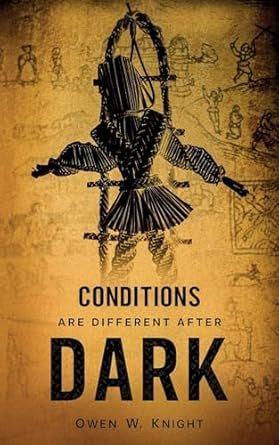
For all things fantasy, horror, and speculative fiction

Review Details
Review type: Book
Title: Conditions Are Different After Dark
Author: Owen W. Knight
Publisher: Burton Mayers Publishing

Reviewed by: Ian Hunter
Other details: Paperback £9.99
Conditions Are Different After Dark by Owen W. Knight
Book Review
Ian Hunter
You won’t be far wrong if you take a look at the cover of Conditions Are Different After Dark. The words “folk horror†pulse in your brain, and the striking cover depicts a “hanged†corn doll.
Owen W. Knight’s novel starts with a prologue set back in 1662 as a wrongly accused man – accused of being a signatory to Charles I’s death warrant – one Captain George Massey, is being executed. Almost like William Wallace, who was hung, drawn and quartered, this innocent victim has endured the agony of being drawn – that is, having his entrails torn out and thrown on a fire – and is about to be beheaded, but not before he talks with a priest and curses the village and the villagers who have betrayed him.
Over four hundred years later, Faith and James decide to move to an idyllic English village with the intention of starting a new life there and possibly bringing up children. We are clearly in a post-Covid, hybrid working world, as James is a financial advisor who can easily work from home, while Faith sells luxury items online, so, again, she can also work from home, and home can be anywhere, so they decide to pull up stakes and move to the countryside.
Life there seems perfect, and Faith wants to embrace village life and fit in; while James is a bit more reticent and distant, even with her at times, they are determined to use the local shops and services, join things, and not come across as obnoxious townies. However, they soon learn of the curse on the village and wonder if their choice of new home was a lucky accident or something else. Things take a turn as they suffer a break-in, their hens are killed, and there are subtle and not-so-subtle warnings to leave. But, the curse is just some words uttered hundreds of years ago, or so some of their new friends insist, although other people – the school teacher and the old priest, have interesting tales to tell about the history of the village.
All in all, Conditions Are Different After Dark is a well-written, well-researched novel. Knight knows the Cotswold area well, where he has sited his own village, so the sense of place is excellent, and it is a short (less than 250 pages), snappy read once it gets going – there is some inevitable character-building and scene-setting, but the pace soon quickens. Knight also seamlessly includes his knowledge of the English Civil War and the customs of the local Cotswold villages, particularly the sports and games they still play to this day. Apart from the “factsâ€, Knight knows how to build tension and unease peppered with twists and turns and some shocking revelations. A minor quibble would be the title, which hardly flows off the tongue. Here, Knight delivers a novel that falls into the category of the “you-don’t-want-to-go-there†sub-genre of horror and included are some of the standard elements of such stories – idyllic (but slightly isolated and stuck in the past) setting, strange locals, stranger goings on, and dark secrets. Mentioning similar fare in books and film would give the game away, although Knight has concocted his own unique way of delivering a tale that is subtle and shocking, even more shocking because of the subtlety or matter-of-factness of the dire events which unfold. If you want a short, sharp, shock and shuddering dose of horror, this book is for you.
Tags: Burton Mayers PublishingHistoricalHorrorIndie PublishingOwen W. KnightWitches
Category: Book Review
All reviews
Latest Reviews:
- The Human Chord by Algernon Blackwood
- The Fog by James Herbert
- A Palace Near The Wind by Ai Jiang
- Extremity by Nicholas Binge
- Girl Dinner by Olivie Blake
- The Swan’s Daughter by Roshani Chokshi
- Out of the Past, Tales of Haunting History edited by Aaron Worth
- Witchborne by Rachel Grosvenor
- Shattered Reality . Call of Cthulhu Scenario Anthology
- The Flesh King by Richard Kadrey
Review tags:
Action (48) Adventure (69) Angry Robot Books (11) Contemporary Fantasy (15) Fantasy (116) Gothic Horror (12) Harper Voyager (12) Historical Fantasy (14) Hodderscape (11) Horror (73) Orbit Books (33) Romance (28) Science Fiction (35) Titan Books (36) TorDotCom (12)
Leave a Reply